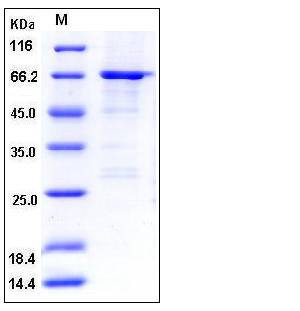Human ATL1 / SPG3A / Atlastin-1 Protein (GST Tag)
AD-FSP,atlastin1,FSP1,GBP3,HSN1D,SPG3,SPG3A
- 100ug (NPP4287) Please inquiry
| Catalog Number | P10523-H09B |
|---|---|
| Organism Species | Human |
| Host | Baculovirus-Insect Cells |
| Synonyms | AD-FSP,atlastin1,FSP1,GBP3,HSN1D,SPG3,SPG3A |
| Molecular Weight | The recombinant human SPG3A/GST chimera consists of 671 amino acids and and has a calculated molecular mass of 77 kDa. It migrates as an approximately 66 kDa band in SDS-PAGE under reducing conditions. |
| predicted N | Met |
| SDS-PAGE |  |
| Purity | > 80 % as determined by SDS-PAGE |
| Protein Construction | A DNA sequence encoding the human SPG3A (NP_056999.2) (Met 1-Thr 447) was fused with the GST tag at the N-terminus. |
| Bio-activity | |
| Research Area | Cancer |Signal transduction |Second Messenger |Nucleotide Messenger |GTP |
| Formulation | Lyophilized from sterile 50mM Tris, 100mM NaCl, 0.5mM PMSF, 0.5mM EDTA, 0.5mM GSH, pH 8.0 1. Normally 5 % - 8 % trehalose, mannitol and 0.01% Tween80 are added as protectants before lyophilization. Specific concentrations are included in the hardcopy of COA. |
| Background | Atlastin-1, also known as Spastic paraplegia 3 protein A, Guanine nucleotide-binding protein 3, GTP-binding protein 3, GBP3, ATL1 and SPG3A, is a multi-pass membrane protein which belongs to the GBP family and atlastin subfamily. ATL1 / SPG3A is expressed predominantly in the adult and fetal central nervous system. Expression of ATL1 / SPG3A in adult brain is at least 50-fold higher than in other tissues. ATL1 / SPG3A is detected predominantly in pyramidal neurons in the cerebral cortex and the hippocampus of the brain. ATL1 / SPG3A is also expressed in upper and lower motor neurons (at protein level). A distinguishing feature of ATL1 / SPG3A is its frequent early onset, raising the possibility that developmental abnormalities may be involved in its pathogenesis. Missense SPG3A mutant atlastin-1 proteins have impaired GTPase activity and may act in a dominant-negative, loss-of-function manner by forming mixed oligomers with wild-type atlastin-1. Defects in ATL1 / SPG3A are the cause of spastic paraplegia autosomal dominant type 3 (SPG3), also known as Strumpell-Lorrain syndrome. Spastic paraplegia is a degenerative spinal cord disorder characterized by a slow, gradual, progressive weakness and spasticity of the lower limbs. |
| Reference |
